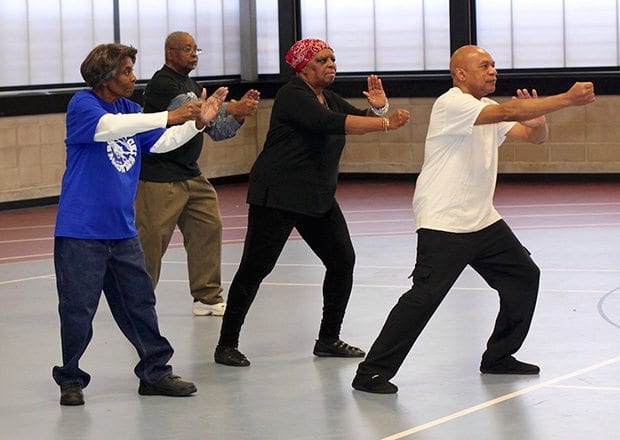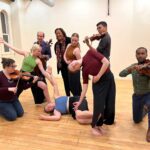

Author: Ernesto ArroyoMaster Heg Robinson demonstrates the t’ai chi pose Repulse the Monkey.
T’ai chi is often touted as an excellent exercise to improve balance and strength in older people. Adonica Chaplain decided she’d give it a try. She’s been practicing t’ai chi (tie chee) with Master Heg Robinson for only a few months while others in the class have 10 years or more under their belt. At 67, she is 20 years younger than many of her classmates.
The fact that she’s in the class at all is in itself quite an achievement. “I hate exercise,” she confessed. “I’d join a gym, go for a month and not go back.” Even walks in idyllic Franklin Park could not hold her interest or attention.
When Chaplain’s 82-year-old aunt asked her to join the class with her, she agreed. “She told me how it made her feel,” she explained. “I’ll give it a try.”
A funny thing happened to Chaplain. T’ai chi accomplished what no gym or walking trail could achieve. She actually likes it. When Robinson took off the month of July for vacation, she missed it. August could not come fast enough for her.
Robinson practices and teaches t’ai chi ch’uan, an ancient Chinese martial art that uses rhythmic movements, meditation and breathing for health and self-defense. T’ai chi consists of a series of gentle, deliberate movements that flow into body positions called “forms.” Students must focus on their breathing and technique rather than strength and power, although good muscle control is required to complete each form satisfactorily.
The movements of t’ai chi are deceptive. Though slow, depending on the intensity, they can be equivalent to a brisk walk or vigorous weight training.
Heg has studied with several masters for many years and now teaches out of his academy in Roxbury and at the Melnea A. Cass Recreational Complex, part of the Massachusetts Department of Conservation and Recreation.
“It works on the mind, body and spirit,” he explained. “It improves balance, posture and can help control diabetes and high blood pressure. It increases strength, stamina and coordination.”
While aerobic and strengthening exercises are recommended for people of all ages, activities to improve flexibility and balance are also important, particularly for the elderly to help prevent falls, which can result in hip fractures.
That is why a large percentage of Robinsons’s students are elderly.
The master ticked off other advantages of t’ai chi. For one thing, it is practical. “Anyone can do it at any age,” he said. “You don’t have to be athletic and you don’t have to wear special clothes. You can practice it anywhere — and if you do it right, you won’t pull a muscle or break a bone.”
You don’t have to convince Chaplain. She’s now a convert. She even likes the warm up exercises, but it’s what she and her aunt call the “dance” that gets her going. The dance refers to the t’ai chi forms. “It’s a beautiful thing,” she said.
Chaplain said she has received a benefit from the exercise she did not expect. She was diagnosed with osteoporosis, or bone weakness, several years ago and takes medicine for the condition. She said that her last bone density test, which measures bone strength, for the first time in years showed an improvement. Although her doctors credit the medicine, she’s not quite convinced. In her opinion it’s the t’ai chi.
Some studies on the health benefits of t’ai chi are contradictory, but there are two areas on which there is strong agreement. There is clear evidence that the exercise is effective for fall prevention. A study published recently in the New England Journal of Medicine found that t’ai chi appeared to reduce balance impairments in patients with mild to moderate Parkinson’s disease. Good balance reduces the risk of falls.
The other area of agreement is improvement in psychological health. Chaplain can attest to that.
“I feel good afterward,” she said.


![Banner [Virtual] Art Gallery](https://baystatebanner.com/wp-content/uploads/2024/04/NJ-H_1-150x150.jpg)




